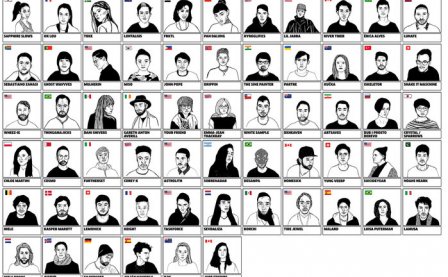There’s something sinister lurking at the core of Scales, but it’s hard to identify right away. Starting at the surface and moving down, it’s easy to follow the playful bob of the crisp, jukey snares against the rolling wardrum toms. Even tracing the occasional tangent of a labyrinthine footwork pattern isn’t what will throw you off — unlike the elastic sense of meter boasted by Teklife cohort DJ Rashad, the rhythmic components of Lil Jabba’s music won’t be terribly jarring to most listeners, especially fans of the genre. In the style of the indigenous stone masks that grace the cover art for every MP3 Lil Jabba slaps up on the web (and the art for this release), the Australian-born, Baltimore- and NYC-dwelling producer uses the familiar monstrosity of footwork as a screen for the deeper enigma of his compositions.
While there are polyrhythms at play here, it’s nothing that screams future riddims so much as equips the listener with a set of quick-footed, cybernetic extensions with which to descend cautiously into the dark, cavernous depths of Scales, filled with woozy toxic haze and crumbling terrain. Lil Jabba has tapped into a sound somewhere between the 1080p hyperreality of the virtual dance floor and the crater of an ancient, smoldering volcano, and I’m not talking about zouk bass.
To be clear, Lil Jabba is fully capable of playing with the listener’s sense of rhythm, but he gets off more on starting with footwork and juke as an anxiety-inducing template across which to stretch his warped compositions: lush tapestries composed of garbled de-anthropomorphic vocals, crooked detuned synth leads, and jazzy chords that phase imperceptibly between harmonic resonance and dissonance. Jabba tends to use rhythm more subtly than a lot of footwork producers (and beatmakers in general, for that matter), racking up major style points by foregrounding the textural finesse of his tracks rather than relying on incomprehensible meter or pure freneticism to try and trap the listener’s brain into spontaneous combustion.
Instead, Jabba harnesses the various tropes typical of footwork and juke and dares them to gaze at his own primeval hallucinations, wherein they are re-stitched together in the shape of a mythical half-analog, half-digital colossus. Anxiogenic, palpitating rhythms slink though atmospheres at once cavernous and claustrophobic, always unclear whether they are expanding or collapsing. Oblique melodies that you didn’t think had any reason to exist worm their way into the collective memory by way of rhythms that hijack and re-energize the earworm potential of the samples Jabba uses, running the gamut from palliative jazz licks to mangled hip-hop bangers. It actually makes a lot of sense that many of the tracks on this compilation first saw physical release via cassette — there’s a gurgling, sibilant depth of texture to many of the tunes on Scales that’s a total anomaly in the increasingly crystal-clear world of bass music.
Not that the Teklife crew Lil Jabba reps doesn’t make weird music — they definitely do. But by the time the vocal sample of “Teklife/ We run this shit” rolls around on “Gorgon,” you’ve been too letting yourself ooze through the amorphous density of the record to remember that people are supposed to be battle-dancing to this music. If Scales has any real shortcoming, it’s just that it’s a compilation rather than a deliberate full-length composition — it’s striking how much the tracks, composed over a matter of years, cohere already, so one can’t help but wonder what Lil Jabba could do with a set of more purposeful material. More than just a curious appendage to the Teklife set, Lil Jabba is pushing towards a visionary, singular sound that goes beyond the conventions of any single genre, and it will be fascinating to witness the reveal of whatever kind of primordial underground caves he unearths next.
More about: Lil Jabba




